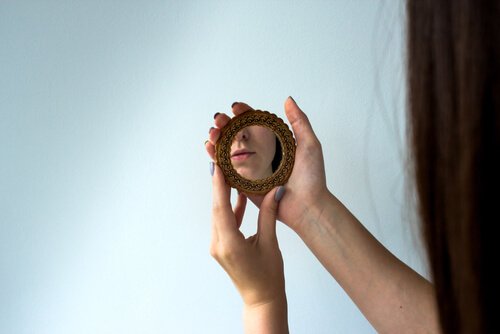How's Your Relationship with Your Body?

Your relationship with your body is not as obvious as you may think. It often remains in the background, despite its importance.
Often, your relationship with your body is either instrumental or functional. It’s instrumental when you assume your body is a means to impact others. In this case, you take care of it so you can be happy with it or you embellish it to attract others. On the other hand, it’s also possible that the opposite happens. You may hide your body from others. Likewise, you may neglect it because you don’t have a good self-concept.
“Take care of your body. It’s the only place you have to live.”
-Jim Rohn-
Your relationship with your body can also be functional. This means you’re conscious of it only when you feel pain or get sick. While you’re healthy, you forget that everything you do, feel, and think biologically takes place within it.

Apathy and obsession with the body
Some people have a distant relationship with their body. They don’t explore it and they don’t know too much about it. It’s also possible that they feel some contempt or apprehension towards it. For those who have that difficult bond, there are usually two extremes. First, there are those who are excessively modest and attentive to their organism. Second, there are those who are basically indifferent about their own body.
Those who become obsessed with their body are generally very apprehensive. They’re especially insistent on the subject of cleanliness and fear germs. Likewise, they don’t tolerate the natural odors of sweat, urine, or feces. In fact, they don’t see them as natural smells, but rather as warning signals.
At the other end of the spectrum, there are those who make deviance the norm. A sign of mental problems is extreme carelessness with body hygiene and the body in general. They prefer not to bathe nor change their clothes. They’d rather stink and usually don’t worry about it. If your relationship with your body falls into one of these categories, you need help.
Emotions and your relationship with your body
Emotions aren’t positive or negative. However, some of them do cause further disruption in the body. By disruption we mean the activation of processes that alter the normal balance in the body. Those emotions are anger, sadness, and anguish. And, of course, there are also those that are a combination or derivation of these last ones: frustration, stress, intolerance, etc. All of these emotions are a response to stimuli your body perceives as threatening.
Your emotions influence your relationship with your body. Many studies state that it’s obvious that emotions help restore organic balance in some cases. In other cases, they lead to diseases. Science has verified that anxiety leads to different diseases, particularly infectious or autoimmune diseases.

Scientists have also proven that anxiety negatively influences surgical procedures. In turn, what we know as ‘stress’ tends to alter the body’s normal recovery processes. Hormone secretion during stress episodes may increase the chances of developing some types of diseases, such as cardiovascular diseases. In addition, they also weaken the immune system.
Many people don’t notice the effects of their emotions on their body. For example, they don’t notice that their heartbeat rhythm increases or that their breathing changes when they feel certain emotions. Nor are they aware of changes in temperature, tension in certain muscles, or the acceleration of some processes.
Your relationship with your body depends on how sensitive and aware you are of the changes that take place in your body.
All cited sources were thoroughly reviewed by our team to ensure their quality, reliability, currency, and validity. The bibliography of this article was considered reliable and of academic or scientific accuracy.
- Kabat-Zinn, J. (2016). Vivir con plenitud las crisis Ed. Revisada: Cómo utilizar la sabiduría del cuerpo y de la mente para enfrentarnos al estrés, el dolor y la enfermedad. Editorial Kairós.
This text is provided for informational purposes only and does not replace consultation with a professional. If in doubt, consult your specialist.








